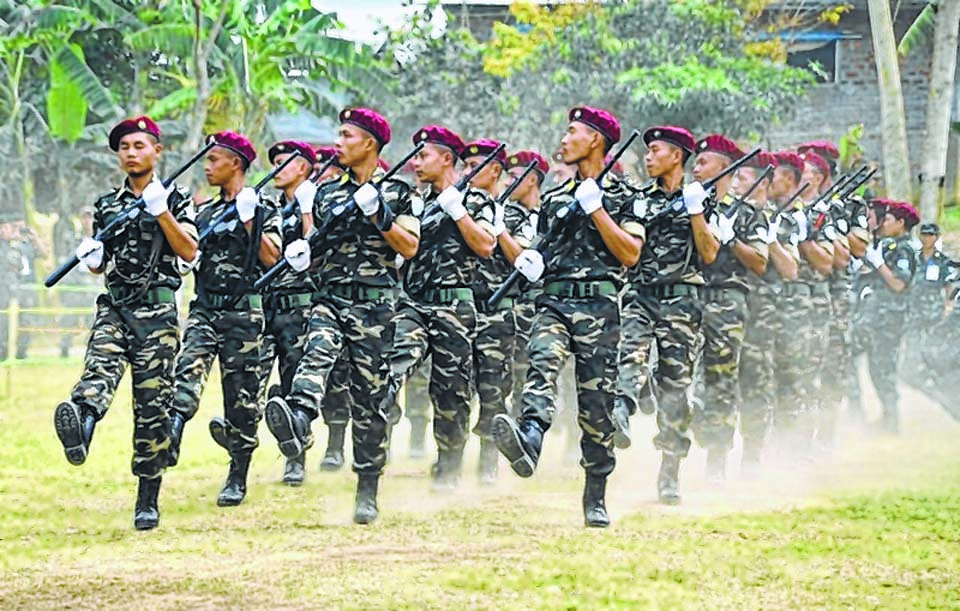NEW DELHI, Jul 12 : Last year, the central govern-ment announced a “historic” breakthrough with the signing of the draft treaty of the Naga peace accord with the National Socialist Council of Nagaland (NSCN-IM). It was projected as one of the biggest initiatives of the new NDA government for peace in the North East.
The draft accord was sign-ed on 3 August by Thuinga- leng Muivah, the general secretary of the NSCN-IM and RN Ravi, the government’s interlocutor in the presence of Prime Minister Narendra Modi, Home Minister Rajnath Singh and National Security Advisor Ajit Doval.
But after the initial brouhaha, the accord was quickly forgotten only to find passing mention on 28 June, with the death of Isak Chisi Swu, the 87-year-old chairman of NSCN-IM.
Upon his death, the prime minister tweeted his condolences: “My heartfelt condo- lences to the family and supporters of Mr Isak Chisi Swu on his demise. May his soul rest in peace… Mr Swu will be remembered for his historical role in bringing out the Framework Agreement for Naga peace.”
Ten days later, it was remembered again when The Hindu published an interview with Thuingleng Muivah. Muivah, unlike the prime minister, recalled the accord only to claim that the NSCN-IM had not given up the demand for sovereignty. Muivah, of course, couched it in niceties, praising the Union government for understanding the Naga problem in the right perspective, and for realigning its position in accordance with the Naga insurgents.
“That’s a blatant lie,” said an officer of the home ministry, involved in dealing with the Naga insurgency for years. “The sovereignty issue is long dead and gone,” he pointed out, referring to the peace accord of 2011, which clearly stipulated that the issue of sovereignty for each state is taken care of in the federal structure of India.
It might appear like the NSCN-IM’s insistence on sovereignty/autonomy explains the complete lack of progress on converting the “historic” draft accord into a full-fledged one.
But Muivah’s sovereignty claim is not the real impediment. The biggest sticky point in going ahead with the “framework” accord it seems; that the government’s interlocutor, Ravi, clearly over- promised the NSCN-IM on a crucial aspect of the accord: the rehabilitation of the NSCN insurgent cadres. In his eagerness to bring the NSCN-IM to the negotiating table, it is believed that the government interlocutor, Ravi, assured Muivah that about 5,000 cadres of the NSCN-IM would be drafted into the Border Security Force (BSF) as part of their rehabilitation process.
The practical difficulties in implementing this plan and the consequent deep differences within the various wings of the central government are what have held up the nearly-orphaned accord. These pre-conditions for clinching the framework have become a major sore point for various arms of the government — the Home Ministry, the Department of Personnel Administration and Training (DoPT), and the governments of Nagaland, Manipur, Mizoram and Assam — the concept of greater Nagaland (Nagalim), as espoused by the NSCN-IM, is intended to be carved out of these very states.
Home Ministry sources say that the demand was quite absurd, and should have been dismissed right away, if not for anything else but for the fact that the NSCN’s cadre strength was hardly above 1,000. “I do not know why the interlocutor had to make such a promise,” said the above mentioned officer.
Two problems have cropped up because of this assurance. One, Muivah is insisting that the recruitment/qualification criterion for BSF be diluted to appoint his cadres and two, he has had to suddenly bump up his cadre strength to 5,000! As of now, the DoPT has rejected the proposal to recruit 5,000 cadres of NSCN-IM because most of them are not fit to be inducted into a central paramilitary force (CPMF). This refusal of the DoPT is bound to upset Muivah who has mobilised over 4,000 additional cadres and is training them in various camps around Dimapur. The second problem has the makings of a tragicomedy. Muivah may have quickly scrambled together 4,000 additional “cadres” because there is no dearth of unemployed youth, but he’s having a bit of a problem training them enough to qualify for recruitment into BSF. Muivah has raised nearly five battalions of “cadre” currently undergoing training in various camps around Dimapur. But he does not have the equipment to train such a large force that has emerged out of nowhere. As a result, he is procuring plastic replica of the American M16 assault rifles in large numbers from a toy maker in Noida, near New Delhi, to familiarise his just-born cadres with the weapon.
This is a comical situation, but nobody is laughing. Because Muivah’s statement about making “Naga sovereignty” a non-negotiable issue carries an underlying tone of threat that if his cadres are not absorbed into the BSF, he will open old demands. A bigger concern for the central government arising out of this outlandish BSF job mela is this: The Naga secessionist group, which had become a dysfunctional, discredited and a moribund entity, has got a fresh lease of life since the “historic” accord last year. It’s ranks have suddenly swelled with the promise of thousands of jobs in the air and if those jobs do not come through, who knows what spurned unemployed youth can do. Even if they have only toy guns. That’s why you don’t hear much about the Nagaland framework accord in New Delhi these days.




